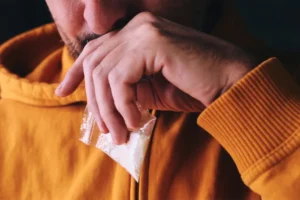Table of content
JOIN FREE GROUP
All About Recovery
Facebook Group • 2213 members
There's always clouds before the rainbows. Join many others who are going through the same thing as you and see proof that it can get better.
JOIN FREE GROUP The Dangers of Cocaine Addiction

Derived from leaves of the coca plant, cocaine is a stimulant that elevates dopamine levels to create a feeling of euphoria and increased energy. It is a highly addictive drug that creates a sense of false confidence and invincibility that can lead to irrational decisions and delusional thoughts that could be harmful.Although it sometimes comes in tablet form, cocaine is usually sold as a powder that resembles white flour. It is taken by being injected into a vein, or by being smoked or snorted through the nostrils. This can result in collapsed veins and infections from shared or dirty needles, damaged nasal passages, or lung disease.Like the vast majority of illegal “street drugs”, cocaine is manufactured without any regard for safety or health. Manufacturers and dealers often increase the quantities of the drugs they produce and sell by mixing the cocaine with substances not intended for human consumption, such as talcum powder and chalk. In some cases, the cocaine will be mixed with heroin, amphetamines and other drugs in order to make it more addictive. Therefore, people who use cocaine never really know what they are getting. This makes it particularly dangerous, and increases the likelihood of a fatal overdose.Many people have a preconceived notion of who is more likely to abuse cocaine. They visualize everything from wealthy people at parties to homeless people in the streets. The reality is that cocaine abuse and addiction affects people from all walks of life, from teenagers who are trying to fit in with a peer group, to overwhelmed professionals who are trying to juggle multiple roles. Cocaine and other drug use can touch all ages and income groups, and it is important not to discount drug abuse warning signs just because the individual might not fit into our picture of a “typical” drug addict.
Signs and Symptoms of Cocaine Addiction
The stimulant properties of cocaine make it a popular drug of choice: it creates a sense of euphoria and confidence that users find appealing. In addition, it generates an energy boost that users believe will help them get through a busy day without fatigue. The problem is that these effects are short-lived. They last up to thirty minutes when the cocaine is snorted, twenty minutes when injected, and only ten minutes when it is smoked. To maintain the feelings of confidence and energy, the cocaine user has to take progressively more of the drug at shorter intervals.The cocaine use signs and symptoms of addiction vary from person to person, but the most common signs include:- Enlarged pupils
- Heightened energy in spite of little sleep
- Rapid weight loss
- Mood swings, irritability, anger and aggression
- Depression, anxiety and paranoia
- Nosebleeds
- Impaired judgment with a tendency to act irrationally
Why is Cocaine so Dangerous?
Cocaine use comes with a number of risks and negative side effects that are exacerbated by the fact that cocaine is frequently mixed with other potentially dangerous substances that the user may not be aware of. Additionally, many cocaine addicts also abuse alcohol or other drugs, and the interactions between substances can produce side effects and withdrawal symptoms that are dangerous and unpredictable. This presents a challenge for people trying to help, such as family members and emergency responders.The risks of cocaine addiction include the following:- Cardiac arrest, stroke and burst blood vessels
- Difficulty breathing
- Elevated heart rate, increased blood pressure, and palpitations
- Seizures
- Damage to nasal tissues as a result of snorting cocaine
- Lung damage resulting from smoking crack cocaine
- Infections, such as HIV and hepatitis, resulting from shared needles
- Depression, anxiety and paranoia
- Poor nutrition, which can damage the immune system and cause organ failure
- Impaired judgment, leading to the tendency to act irrationally without considering the potential for negative consequences
- A feeling of over-confidence that leads to a disregard for danger
The risks of maternal cocaine abuse
Most female cocaine users are of childbearing age. Although it is estimated that around 5% of pregnant women have active substance use disorders, this figure may be understated due to reluctance to report drug-exposed pregnancies.However, pregnant and nursing women should be aware of the risks of cocaine to themselves and their babies. Using cocaine during pregnancy can result in maternal migraines and seizures, premature rupture of membranes and placental abruption. Since both pregnancy and cocaine use raise blood pressure, combining them can lead to serious cardiac problems.Cocaine-addicted mothers may give birth to babies who are underweight, and addicted to drugs. Cocaine withdrawal, already dangerous to adults, can be fatal in newborns. Babies that do survive can suffer long-term physical, psychological and cognitive effects. New studies are finding that adolescents who were exposed to drugs prenatally may be at higher risk of memory and language problems.Bearing in mind that newborns who are addicted to drugs can suffer effects that can last well into the teenage years and possibly beyond, it is important that pregnant women report any drug use to their doctors so that the detrimental effects to mother and baby can be minimized.Why Treatment is Important for Cocaine Addiction
Since cocaine is fast to react and poses dangerous health risks like high blood pressure, central nervous system damage, heart attacks, and more, it is important to get the professional help you need before it is too late. The more you use cocaine, the more damage it does to your body, and the more the addiction will adversely impact your health, your life and your relationships.No matter how difficult your situation is, an effective detox, rehab and treatment program can help you. Through a custom-designed treatment plan that incorporates group, individual and family therapy, you can get valuable peer support, professional advice and relationship counselling that will enable you to overcome your addiction, and lead a healthy, happy and productive life.In many cases, people who are addicted to cocaine attempt to quit by themselves, but their attempts are foiled by the environment they live in, the people they associate with, the pressures of life, untreated mental illness, and the intensity of withdrawal symptoms and cravings. Those who seek help to quit are far more likely to succeed and far less likely to experience a relapse than those who attempt to quit on their own.Cocaine Addiction Treatment Options
It is important to remember that addiction treatment cannot follow a “one size fits all” model. Addiction is almost always rooted in context: it arises from trauma, abuse, stress, mental illness, difficult relationships, financial strain and other factors. Everyone’s path to addiction is different, and therefore everyone needs to follow their own unique path to recovery.Facilities that conduct comprehensive assessments and provide customised treatment plans are more likely to lead their clients to a successful recovery than those that don’t. The treatment methods that work for one person might not work for someone else. In addition, recovering addicts do better in facilities that treat the person rather than the addiction. It is important to consider all aspects of an individual’s physical and mental health, their relationships with friends and family members, their interests, beliefs and values. This ensures that the individual learns coping techniques and life skills that are relevant to their unique needs and circumstances.Medical Detox
In many cases, addicts need to begin their rehab with medically supervised detox to ensure their safety while the drug is working its way out of the bloodstream. This is because the individual develops a cocaine dependence over time, which means they are physically and psychologically reliant on the drug. This can make withdrawal symptoms uncomfortable, frightening and in some cases, dangerous. The purpose of medical detox is to keep patients safe and manage these symptoms as they arise.For some individuals, this may mean the use of medication to control cravings or manage symptoms.Medications that are sometimes used during detox include the following:- Modafinil: boosts wakefulness and improves dopamine production
- Gabapentin: reduces mood swings and helps with neuropathic pain treatment
- Topiramate: anticonvulsant to reduce central nervous system activity, which in turn eases agitation
- Baclofen: relaxes the muscles and reduces mood swings
Inpatient Cocaine Addiction Treatment
If you choose inpatient addiction treatment and rehab, you are committing to stay at a facility, where you will receive round the clock care and full accommodations that include your own living space and meals, as well as access to amenities and on-call care whenever you need it. You will be in a safe, caring environment that is free from judgment, and where staff and fellow residents want you to succeed.There are many benefits to inpatient addiction, including the following:- You can focus on your recovery without having to worry about the stresses of life
- You are in a self-contained environment that is free from the temptation of drugs
- Medically supervised detox is provided to keep you safe and comfortable during withdrawal
- You have easy access to your individual, group and family therapy sessions
- Your progress is constantly monitored, and tweaks to your treatment plan can easily be made if needed
- In addition to addiction treatment services, you will receive care for other physical or mental health concerns that may impact your addiction
Outpatient Cocaine Addiction Treatment
Inpatient addiction treatment is not for everyone. Many people do not have the financial resources to commit to it, nor are they able to leave their lives behind in order to focus solely on recovery. For these people, treatment is available in the form of outpatient treatment and rehab that allows them to work on overcoming their addiction while continuing to go to work or school, and continue with their daily lives.During outpatient treatment, you continue to live at home, while visiting the treatment centre for scheduled group, individual and family therapy sessions. Although you do not have the same level of round-the-clock care, your progress is still carefully monitored, and your treatment plan can be adjusted if needed. Outpatient rehab can be successful if the program is diligently followed, especially for people who have a strong support system at home.Some benefits of outpatient treatment include the following:- It is a more affordable option for people who do not have the means to pay for inpatient treatment
- As you learn new life skills and coping techniques, you can immediately start to use them in your regular life
- You can continue to work towards your work or school goals




